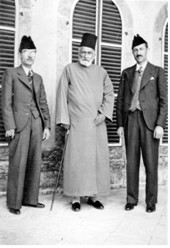Jalili dynasty

Ismail Al Jalili (1865-1943), with his sons Sadeeq Al Jalili (1903-1980) and Qaidar Al Jalili (1914-1995)
|
|
| Ethnicity | Iraqi |
|---|---|
| Current region | Mosul, Iraq |
| Members | Abdul Jalil, Isma’il Pasha al-Jalili, Hussein Pasa al-Jalili, Muhammad Pasha Jalili, Mahmoud Beg al-Jalili |
The al-Jalili family (Arabic: الجليلي), are an Iraqi family who served as effective rulers of the city of Mosul, Iraq between 1726 until 1834, during its integration as a district of the Ottoman Empire. They are credited with investing considerable capital in religious institutions and charitable activities, as well as benefiting systems of patronage and considerable growth in cultural activities within the capital during this period.
The al-Jalili family traces their origins to the Diyarbakir Province. The first prominent Jalili, "Abdul Jalil" was a Christian employed in the Pasha’s household during the late seventeenth century. At this point the family had already established themselves firmly as notables within the Mosul elite, exerting both political and economic influence:
The Jalili family’s fortune seems to have been the result of their effectiveness as grain merchants and contractors. With their wealth they successfully acquired leadership in the Janissary corps, the right to collect certain taxes, property in the city and countryside, the government’s gratitude for their help in winning the war, and continuing alliances for access to local resources.
Along with the al-Umari and Tasin al-Mufti families, the Jalilis formed an "urban-based small and medium gentry and a new landed elite", which proceeded to displace the control of previous rural tribes. Such families proceed to establish themselves through private enterprise, solidifying their influence and assets through rents on land and taxes on urban and rural manufacturing. Fortifying "a powerful political dynasty with the acquiescence of the central Ottoman government" families such as the Jalilis developed into ruling elites within a progressively stratified social hierarchy, leading to the development of increasingly exclusive breeding patterns and lineage. As Gertrude Bell recounted of one of the Jalilis during her travels through Iraq in 1910:
I sat long in the guest chamber of a third acquaintance, the head of the greatest family in Mosul. So stainless is his lineage that his sisters must remain unwed, since Mosul cannot provide a husband equal to them in birth. His forebears were Christians who migrated from Diyabekr two hundred years ago. The legend runs that his Christian ancestor, soon after he had come to Mosul, went out in the morning to be shaved, but when he reached the barber’s shop it was filled with low-born Moslems and the barber kept him waiting until the heads of the Faithful had been trimmed. “Shall a man of my house wait for such as these?” he cried, and forthwith abjured the creed of slaves.
...
Wikipedia
